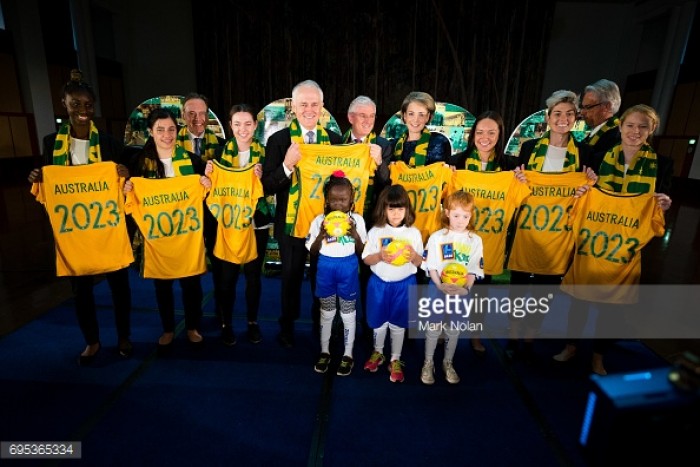Expansion is the buzz word littering every FIFA dossier. On the minds of delegates, at FIFA congress about developing women's football into a global brand. Where players become recognisable household names. Young girls able to witness their idols play. Capturing the imaginations of those, who have never given women's football a second thought. For one nation the sport has already captured its imagination.
Australia is one of the global power-houses of sporting achievement. It Has an unrequited but often outwardly misunderstood, love affair with the beautiful game. The Aussies love football! The country boasts world class stadiums and facilities, a vocal sport attending public and a proven track record in hosting major sporting events. Encompassed with a growing confidence in the Football Federation of Australia. There is little doubt that Australia has more or less everything at its disposal to host the jewel in the crown of women's football, the World Cup in 2023.
Ann Odong, Editor of The Women's Game. Certainly does believe, through hosting a successful 2015 Asian Cup. Proved Australia has the capacity to deliver, a high specification football tournament. With a real appetite to see more world class tournaments grace Australian soil.
Big names offer support
"Although some people are wary after the last bid to host a FIFA tournament, from the reaction on social media there appears to be a re-gained appetite for Australia hosting a football tournament. I think the successful hosting of the 2015 Asian Cup demonstrated Australia's capacity to provide a wonderful experience for local football supporters, the Australian public in general and visiting supporters.
Although some people are wary after the last bid to host a FIFA tournament, from the reaction on social media there appears to be a re-gained appetite for Australia hosting a football tournament. I think the successful hosting of the 2015 Asian Cup demonstrated Australia's capacity to provide a wonderful experience for local football supporters, the Australian public in general and visiting supporters."
Australia does have sport hard-wired into its DNA, almost to a national obsession. Culturally diverse in its views on football. With a domestic league in the W-League developing. Player and grass-roots participation increasing steadily year by year. Internationally earning plaudits for a fluid style of play. Consistently ranked in the top 10 nations, in FIFA standings. Put simply Australia has a football pedigree.
In order for any bid to be successful, it needs overwhelming political support. Not securing a political consensus, would be hugely damaging to any bid.The Australian bid does have cross-party support. With the government putting on the table $1 million Australian dollars to get the bid off the ground. With a further potential investment of $4 million further down the bid process. It Demonstrates a renewed confidence of success of the bid. Odong also highlights the absolute fundamental need for bipartisan support.
"To have bipartisan support is key as the bid and possible preparation could have across different governments."
Australian Prime Minister Malcolm Turnbull offered his total support for the bid.
"It's a great initiative. It's a great goal. And I'm excited to announce that the government will be backing the FFA's (Football Federation Australia) bid for Australia to host the 2023 Women's World Cup."
The Matildas are leaders on the international stage and they are wonderful role models in our community. Wouldn't it be fantastic to have the Matildas contesting a Women's World Cup on home soil, here in Australia?"
It is support that is vital to securing the WWC. Football politics is such, even cross-party support may not be enough. FIFA have burned Australia and the FFA in the past. What's the old adage if at first you don't succeed, try, try and try again. Nothing in the WWC 2023 bid can be taken for granted.
Australian football Chairman Steven Lowry also spoke about the benefits both sporting and structural improvements that the World Cup would bring.
"The benefits to Australia are many and varied with major economic impact to the wider community and, most importantly, a massive increase in exposure and investment in Women’s Football.A FIFA Women’s World Cup in Australia would inspire a whole new generation of girls and women to take up the biggest participation sport in Australia, for many with the dream of winning the World Cup on home soil.”
Engagement benefits there to see
It's hard not to agree with Lowry, the benefits of engagement during and preceding the World Cup in Canada saw ripples throughout the game domestically. The television viewing figures nearly topping 800 million. Millions of Canadian dollars lining the local economies of host cities. Coupled with the live your goals campaign designed to engage, motivate and support female player participation. Arguably FIFA's most concerted attempt to make a global impact on young female participation levels. Could offer a blue-print for Australia to see a further generational shift in youth participation.
Already according to the Australian Sports Commissions report on sporting participation levels. Football has cemented itself as the countries leading sporting pastime. With around 4.5% of the Australian population, participating in the sport at some level. The power and the reach of the WWC, could further increase this figure. In-line with FFA's broader "We are football" vision for the sport in Australia. People are truly engaged with the sport.
With an outward looking, revolutionary vision. Leads PFA Player Relations Executive Kathryn Gill, to believe that it would accelerate growth in all stratas of the game.
"The women’s game has reached the point of being the largest participation sport for young girls. The Matildas are amongst the very best teams in world football and the W-League has the capacity to be a leading competition, both domestically and internationally."
"If we are to begin to leverage these strengths, and the many other competitive advantages of football, we must be bold in our ambitions for the sport. The women’s game must be a priority and today’s announcement illustrates the capacity of it to turbocharge Australian football.”
PFA Chief Executive John Didulica also cited a World Cup in 2023, would invoke a "powerful image" in concert for both players and fans. The transformational effect the WWC could hold, for all six federal territories. Provides a potentially strong and meaningful legacy.
Setting out that legacy is a huge part of any successful bid. FIFA and most governing sporting bodies, now demand it. Australia must set out a bold vision to FIFA. Ann Odong who is a leading proponent of the Australian game. Raises an important point on this subject of legacy. She believes there does need to be a "whole game" approach targeting every aspect of the game.
"The hope is that an Australian WWC would be partnered with investment and consideration given to the whole of the game. The FFA has stated that an Australian WWC is a part of their greater women's football strategy and honestly, for the WWC to be worthwhile, it needs to have a lasting legacy.
That legacy should be evident in the growth of the women's game in the country. Not just in the numbers of participants but the increased facilities and infrastructure, improved pay and conditions of the W-League players and further professionalisation of the Matildas to be in line with the best nations in women's football.
It has to go hand in hand because ultimately it would be devastating to the game if there is short term gain through a WWC and long term the game suffers irrevocably."
Hosting the World Cup in 2023 is one of the key objectives for the FFA. Whilst there are drawbacks within the structure of the W-League. Investment in better facilities in Australia for the Women's game. Should in theory create frameworks to improve pathways, for players to increase participation and bring young talent. Inspired by seeing the world's best, into the elite athlete pathway system and further up the football pyramid that much quicker.
Crucially and critically keeping younger players in the game who now are in a position to see the value of remaining in the sport. Over perusing other sporting avenues or career alternatives.
On the pitch the Matilda's have secured consistent Quarter-final berths at major tournaments. Won concessive OFC championships and an AFC championship. Play with fearlessness and a unique sense of identity. These players deserve and have earned the right, to play on the biggest stage of all on home soil. For years there has been a feeling of growth, that Australia can push themselves forward. To not mearly stagnate but be even more competitive. Hosting the WWC will go some way in fulfilling its 20 year vision. And improve the national set-up that much quicker. It's one of the reasons why there needs to be a WWC in the region.
To offer a real push towards expanding the games reach into the southern Pacific region. As an offshoot of a successful Australian bid. Elite football can be distant in some regions, less so if it's right on your doorstep.
Fans all over the world on the announcement, that Australia were set to bid. Offered widespread support. It does inherently feel that it would be a popular decision. Such is the respect for the Australian game. People feel connected to the Aussie game.
The opportunity to host such a prestigious tournament, at a time of global expansion to the game. Ensuring a key objective of its 20 year plan, for the Australian game.Is a tantalising prospect that the FFA and Australian government, must do everything they can to secure. Australia is renowned the world over, for creating some of sports most iconic moments. That live long in the memory. The same will apply for an Australian World Cup. After a bruising failed bid to host the men's 2022 World Cup. Should embolden the country, to secure the WWC in 2023. Not mearly as a consolation prize.But it's chance to make its mark on the global football landscape.
Japan has singnaled their intent to bid. Which would mark a significant threat to FFA ambitions. Accompanied with the Federación Colombiana de Fútbol also expressing interest. Giving FIFA a perfect opportunity to regenerate, and kick start a potential South American football nation powerhouse. Offsetting an imbalance of power and investing in a less developed nation. Provides the optics of inclusion and balance. Is another threat to Australian chances.
Australia has all the structural elements to fulfil all the technical requirements, required by FIFA. The fan base and a team that would progress deep into the tournament. An extraordinary vision to create a sustainable working legacy, long after the trophy had been hoisted aloft. In essence and to be frank, It would be an absolute mitigated travesty if Australia did not welcome the world's finest in 2023.
But what do the rest of the Vavel staff think of a potential WWC in Australia?
"Whilst we've seen WWC's in Asia before, Oceania is yet to host and for a country that is a consistent fixture in the top ten in the world, it's high time Australia had a major tournament on home soil. Admittedly they may see less travelling fans from Europe and even the Northern Hemisphere, but Europe doesn't have a monopoly on football and it's a fantastic chance for Australia to showcase itself and for the Matildas to really shine. If you look at the team Stajcic has now, 2023 could be seen as one of the last outings for a golden generation. "
Sophie Lawson
"I think Australia are doing really well with engaging sports fans with women's sports. Look at the first season of the Women's AFL, that went extremely well. Having an occasion like the World Cup would be huge for WoSo in the region. Hopefully could see the W League gain more attention and funding, too."
Katie Mishner






































